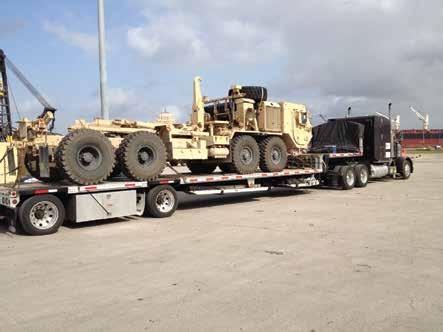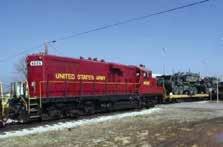
9 minute read
FEATURES
SOLDIER FOR LIFE The US Army Transportation School’s Workforce Credentialing Programs
Today the Army projects its combat power to locations throughout the world using a joint deployment process in all environments utilizing multiple modes of transportation. This requires detailed & timely planning, accurate documentation and data provision, visibility throughout the process, immediate and rapid response, the simultaneous execution of multiple actions, an in-depth knowledge of regional nodes and regulatory guidelines, and immense personal courage and sacrifice; all hallmarks of military logisticians and skills that are sought-after in commercial transportation environments. Throughout their careers, military professionals strive to learn new skills and develop their abilities. The US Army’s Soldier for Life (SFL) program is designed to enable soldiers, veterans, and their families to leave military service “career ready,” and find an established network of enablers connecting them with the employment, education, and healthcare support required to successfully reintegrate into civilian society. As part of this program, the Army is working with civilian industry, trade associations, unions, other federal departments, veterans groups, and the academic community to explore civilian credentials and licensing. The Army’s credentialing program goal is to establish professional credentialing opportunities for soldiers. Credentials enhance Total Force Readiness
6 | Defense Transportation Journal | MARCH 2015 by helping soldiers learn to enhance their military skills with the best practices of business. Soldiers are able to keep pace with the latest developments in civilian industry within their military skill set. Credentialing promotes lifelong learning opportunities throughout a soldier’s Lifecycle of Service. Credentialing opportunities fill the role of professional self-development in a soldier’s military occupational specialty. Most credentials have increasing levels of difficulty; as a soldier progresses in their career, they can use their new skills and experience to demonstrate what they have learned while increasing their professional knowledge.
The Combined Arms Support Command (CASCOM) is at the forefront of
We call it Logistics.







At Universal, we offer outstanding and diverse freight options. The Universal Government and Emergency Services Division provides the planning, procurement and on-site project management to execute complex projects to deliver cost effective solutions to challenging missions.





Our team provides a single point of contact for the United States Government and its affiliates, utilizing our vast portfolio of service offerings to meet our customer objectives.
• Transportation Services • Value Added Services • Intermodal Services • Specialized Services






assessing its soldiers’ skills to enhance developmental opportunities and ease the transition from military to civilian careers through professional credentialing programs. Credentialing increases a soldiers’ ability to find rewarding jobs when they leave active duty and enhances skills while still serving. CASCOM’s credentialing initiative is in support of the Army’s Soldier for Life program, and the Presidential Task Force on Veteran Employment Opportunities. The task force’s focus is on promoting civilian credentialing for service members to enhance their employment possibilities. Efforts by CASCOM at Fort Lee, Virginia have led to the development and testing of over 78 credentialing programs and the enrollment of over 17,000 soldiers. Currently over 14,000 soldiers have received certifications or civilian licenses.
As part of CASCOM, the US Army Transportation School (USATSCH) is helping to increase opportunities for their transportation soldiers by developing a credentialing program for all 88 series military occupational specialties— whether a service member is separating after four years or retiring with more than 20 years. In-service credentialing provides transporter soldiers verifiable credentials and experience that is readily recognized by industry, improving the profession and smoothing transition from military life to becoming a civilian transportation professional.
In May, 2011, the Department of Transportation’s (DOT’s) Federal Motor Carrier Safety Administration finalized the Commercial Learner’s Permit Rule. Within that rule is a provision that gives State Driver Licensing Agencies (SDLA) the authority to substitute two years of commercial motor vehicle safe driving experience in military equivalents of commercial motor vehicles for the skills test portion of the commercial driver license skills test. This new provision is called the Military Skills Waiver (MSW) and affects 88M soldiers across components. Currently, 50 States & the District of Columbia accept this waiver. This provision also ties into the Soldier for Life program as it aides soldiers with their transition from the military. For reserve component soldiers, it allows them to use their skills to obtain jobs while still in the military. On 8 July 2014, the Federal Motor Carrier
Combined Arms Support Command, Fort Lee, VA.
Safety Administration extended the application period for the military skills test waiver from 90 days after discharge to one year after discharge. To date, over 7,300 Commercial Driver’s Licenses (CDLs) have been issued to 88M Soldiers across the 50 states via the MSW.
In addition, USATSCH Office of the Chief, Reserve Affairs (OCRA) worked with the state of Virginia in the development of the “Troops to Trucks” program. This ground breaking concept put the Military Skills Waiver into action enabling service members to obtain Virginia CDLs via the MSW. Since initiation in July 2012, over 368 service members obtained CDLs across the state of Virginia. The state also tied its Employment Office Veterans Preference Identification to the “Troops to Trucks” program, earmarking over 56,837 job opportunities for transitioning soldiers. “Troops to Trucks” operates on six military bases in Virginia, and the Army points to Virginia’s program as an example for other states looking to develop programs of their own.
On 8 January 2013, members of the US Army Transportation School met with the Federal Railroad Administration (FRA) to discuss FRA credentialing for the Army’s Rail Operations personnel (88U). Rail credentialing establishes the US Army as a Class III Railroad, which in turn enables all Army rail operating personnel (engineers) to use their military certification to enter into the commercial railroad industry. This credentialing also allows Army rail personnel to conduct rail operations in response to

An 88M Non-Commissioned Officer admiring a Commercial Tractor.

national emergencies, if requested. The US Army Transportation Corps’ Rail elements operate on or near several military installations and, in some cases, provide rail services to private industry for profit. In December of 2014, the credentials of military locomotive engineers and conductors were accepted by the FRA, and recognized as equal or exceeding the certification for any Class III Railroad.
On 18 December 2014, the USATSCH hosted Senator Tim Kaine (D-VA) at the Maritime & Intermodal Training Division (MITD) on Joint Base Langley-Eustis, VA, to showcase Army credentialing efforts within the maritime Military Occupational Specialties (MOS 88L – Watercraft Engineer and 88K – Watercraft Operator). Soldier for Life credentialing efforts by MITD focus on cross-walking MITD maritime course material with US Coast Guard (USCG) National Maritime Center (NMC) Merchant Marine License requirements, and have seen the addition of 12 new maritime credentials for 88K/L soldiers and 880A/881A warrant officers. These efforts have increased
Senator Tim Kaine (D-VA) Operating the Landing Craft Mechanized (LCM-8) in the MITD Small Craft Bridge Simulator.

the maritime credential total for Army mariners to 28 credentials that support the award of a USCG Merchant Marine Document and/or License. These efforts show a cost savings between $4,000 dollars for a junior enlisted 88K/L Soldier, and upwards to $22,000 dollars for a senior warrant officer.
Another way that USATSCH is supporting military professional credentialing of its service members is through the Certified Export Specialist (CES) course offered by the National Customs Brokers and Forwarders Association of America (NCBFAA). This is a certification pro
The Army owns 113 Locomotives and Operates 2,500 miles of Track.

gram which is designed to help trade professionals involved in the export industry become competent and knowledgeable in current export regulations. In November of 2013, under an agreement with USATSCH and in support of 88N Transportation Management Coordinators and 882A Mobility Warrant Officers, the NCBFAA Educational Institute (NEI) waived the 10-year experience requirement for their Certified Customs Specialist (CES) Course and examination. As well, NEI reduced tuition rates by 52% for their on-line course. [Read more on this credential page 10!]
We are beginning work on our next credentialing effort for Army cargo handling specialist. These Soldiers operate material handling equipment, conduct inland terminal cargo transfer operations, and perform ship upload and discharge operations. We are seeking assistance from the various industry partners and port authorities in determining what credentialing opportunities are available to these soldiers.
“These programs are the epitome of a ‘win-win’ situation for all participants,”

States Army Colonel Nancy Grandy, Assistant Commandant of the US Army Transportation School. “We support the continued engagement of industry and academic partners in the development of accreditation and licensing across the Army transportation spectrum to meet their goals as well as ours—particularly when it means that our soldiers transition skills from the Army to the needs of commerce.”
The hallmark of credentialing is that it translates soldiers’ skills into language civilian employers can understand. Employers who understand the skills of veterans generally hire veterans. Credentials demonstrate to employers a mastery of skills critical to the needs of business and industry, increases the number of jobs available, and helps soldiers achieve higher salaries. The USATSCH’s leadership in certification and licensing, and its cooperation and collaboration with the US Department of Transportation is evident in currently expanding national programs, and it will not stop there.
“We need feedback from the civilian transportation community,” said COL Grandy. “Contractors, companies and government-led agencies want to employ our soldiers, and we want to fulfill credentialing needs while our soldiers are serving. It’s not our primary mission,” she said, “but it supports our primary mission, our recruiting, our retention, and our promise to our soldiers.”
Parties interested in what Transportation Corp soldiers have to offer, and those that have in-service credentialing issues, remedies or feedback, are welcome and encouraged to contact the Department Directors within the USATSCH:
Mr. Jeff Skinner – Army Driver Standardization Office (ADSO) 804-765-1955 jeffrey.e.skinner4.civ@mail.mil
Mr. Don Topping – Maritime & Intermodal Training Division (MITD) 757-878-4100 donald.a.topping.civ@mail.mil
Ms. Helena D’Amario – Deployment & Deployment Systems Department (DDSD) 804-765-1939 helena.m.damario.civ@mail.mil DTJ




